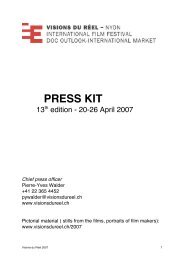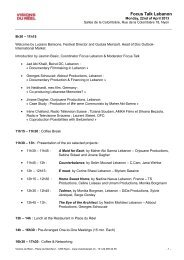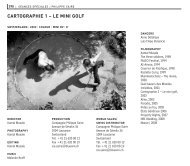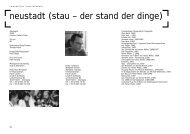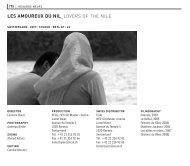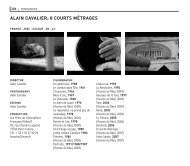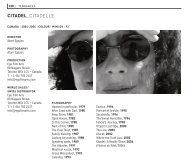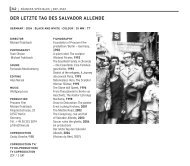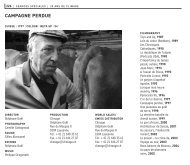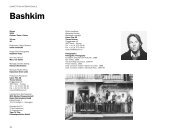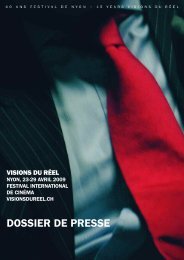Katalog 2013.pdf - Visions du Réel
Katalog 2013.pdf - Visions du Réel
Katalog 2013.pdf - Visions du Réel
Create successful ePaper yourself
Turn your PDF publications into a flip-book with our unique Google optimized e-Paper software.
164 atelier – laila pakalnina<br />
laila<br />
pakalnina<br />
biography<br />
SELECTED FILMOGRAPHY<br />
(Documentary Films)<br />
2012 Sniegs (mlf)<br />
2011 33 Zveri ziemassvetku<br />
vecitim (mlf)<br />
2010 Pa Rubika celu (mlf)<br />
2008 Par dzimteniti (mlf)<br />
2006 Teodors (mlf)<br />
2004 Leiputrija (mlf)<br />
2004 Autobuss (mlf)<br />
2004 Bus Labi (sf)<br />
2002 Martins (sf)<br />
2001 Mostieties! (sf)<br />
2001 Papa Gena (sf)<br />
1997 Ozols (sf)<br />
1996 Pasts (sf)<br />
1996 Pramis (sf)<br />
1995 Ubans (mlf)<br />
1993 Baznica (mlf)<br />
1991 Doms (sf)<br />
1991 Vela (sf)<br />
1991 Iesana (sf)<br />
Laila Pakalnina est née en 1962 à<br />
Liepaja, en Lettonie. En 1986, elle est sortie<br />
diplômée de l’Université de Moscou et<br />
a continué ses études au VGIK d’où elle a<br />
obtenu un diplôme en 1991, année de l’indépendance<br />
de la Lettonie après la dissolution<br />
de l’Union soviétique. La Lettonie<br />
est à la fois son pays et sa muse : depuis<br />
1991, elle n’a eu cesse de suivre les changements<br />
qui ont eu lieu après l’indépendance<br />
à travers une vision profondément<br />
personnelle, à mi-chemin entre le lyrique<br />
et le grotesque : ponctuées de clins d’œil<br />
récurrents au cinéma russe classique,<br />
les situations, les formes et les attitudes<br />
pourraient souvent rappeler Chaplin et,<br />
surtout, Tati. Laila Pakalnina développe<br />
une approche antinaturaliste originale<br />
qu’elle utilise avec des variations de tonalité<br />
dans toutes ses œuvres, et qui répond<br />
à des règles internes strictes : les mots ne<br />
sont jamais mis en avant contrairement<br />
aux petits gestes auxquels la réalisatrice<br />
donne un maximum de sens. Elle utilise<br />
également les sons de manière créative<br />
ainsi qu’un encadrement extrêmement<br />
élégant et riche de sens. Les films de<br />
Laila Pakalnina sont marqués par un<br />
univers complexe et pourtant extrêmement<br />
accessible, un cocktail unique de<br />
légèreté et de profondeur dans lequel<br />
la réalité, souvent <strong>du</strong>re, qu’elle dépeint<br />
devient étrange, ironique et incroyablement<br />
poétique.<br />
Laila Pakalnina wurde 1962 im lettischen<br />
Liepaja geboren. 1986 machte<br />
sie ihren Abschluss an der Universität<br />
Moskau und setzte ihr Studium am VGIK<br />
fort, das sie 1991, im Jahr der Loslösung<br />
Lettlands von der Sowjetunion,<br />
abschloss. Lettland ist ihre Heimat und<br />
ihre Muse: Seit 1991 hat sie unermüdlich<br />
die nach der Unabhängigkeit eingetretenen<br />
Veränderungen mit einem sehr<br />
persönlichen, zwischen lyrisch und grotesk<br />
schwankenden Objektiv verfolgt:<br />
Situationen, Formen und Haltungen,<br />
die oft an Chaplin, noch mehr aber an<br />
Tati erinnern und von wiederkehrenden<br />
Reminiszenzen an das klassische<br />
russische Kino zeugen. Laila Pakalnina<br />
entwickelt einen eigenen, antinaturalistischen<br />
Ansatz, den sie mit variierender<br />
Tonalität in allen Arbeiten verfolgt und<br />
der auf strengen inneren Regeln beruht:<br />
Worte sind nie der Schlüssel, relevant<br />
sind die kleinen Gesten, der kreative<br />
Gebrauch des Tons und die äussert stilund<br />
bedeutungsvollen Einstellungen.<br />
Die Filme Laila Pakalninas tragen die<br />
Merkmale einer zugleich komplexen<br />
und sehr zugänglichen Welt, einer einzigartigen<br />
Mischung aus Leichtigkeit<br />
und Tiefe, die der oft rauen Realität<br />
etwas Merkwürdiges, Ironisches und<br />
zutiefst Poetisches verleiht.<br />
Laila Pakalnina was born in 1962 in<br />
Liepaja, Latvia. In 1986 she gra<strong>du</strong>ated<br />
from Moscow University and continued<br />
her studies at VGIK gra<strong>du</strong>ating in 1991,<br />
the year when Latvia became independent<br />
from the dissolving Soviet Union.<br />
Latvia is both her country and her muse:<br />
since 1991 she has ceaselessly followed<br />
the changes which occurred after independence<br />
through deeply personal<br />
lenses, between the lyrical and the grotesque:<br />
situations, forms and attitude<br />
could often recall Chaplin and especially<br />
Tati, punctuated with recurring glimpses<br />
reminiscent of classic Russian cinema.<br />
Laila Pakalnina develops an original<br />
antinaturalistic approach, which she<br />
employs with tonality variations in all<br />
her works and which has its strict inner<br />
rules: words are never the keypoint<br />
and maximum relevance is given to<br />
the smaller gesture, to the creative use<br />
of sound, to the extremely stylish and<br />
meaningful framing. The films of Laila<br />
Pakalnina bring the marks of a complex<br />
and yet extremely accessible universe, a<br />
unique mixture of lightness and depth, in<br />
which the often harsh reality she depicts<br />
becomes odd, ironic and utterly poetic.<br />
Paolo Moretti



